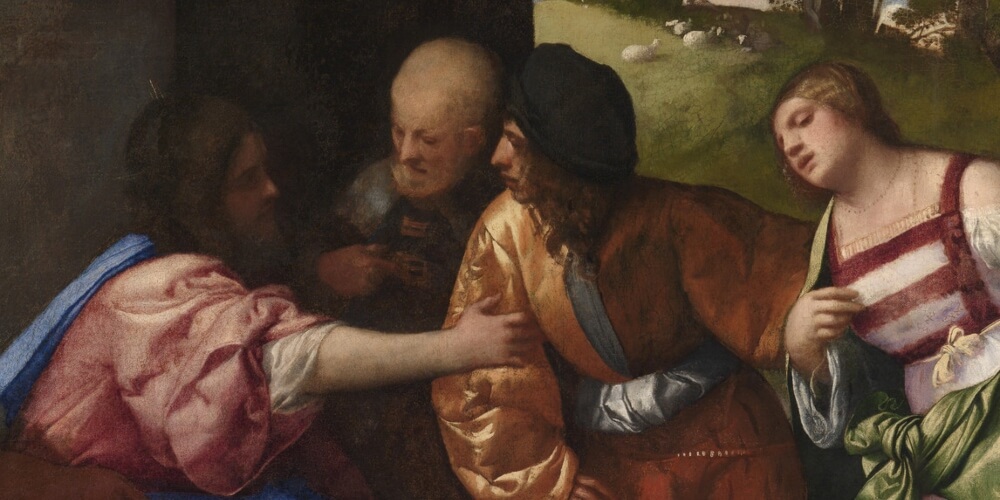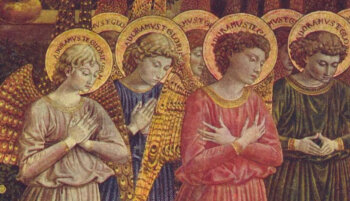
Most of us have heard the wise instruction to “hate the sin and love the sinner.”
It’s a clear lesson in living true charity and mercy while simultaneously standing up for what we believe.
As our world becomes more complex, however, it’s gotten harder to explain, and sometimes, to live. It’s a saying that’s now misunderstood and viewed with hostility.
But the truth remains, and St. Paul has the keys to living it today—and explaining it to others.
Where Did the Saying Originate?
The original saying is most likely taken from the letters of St. Augustine. In Letter 211, he writes, “Cum dilectione hominum et odio vitiorum,” which translates, “With love for mankind and hatred for sins.”
Over time, this became “love the sinner and hate the sin.”
Mohandas Ghandi’s autobiography restated this teaching in 1929 when he wrote, “Hate the sin and not the sinner is a precept which, though easy to understand, is rarely practiced, and that is why the poison of hatred spreads in the world.”
Why Has It Become Harder to Explain Today?
In a recent discussion with my fifteen-year-old son, I found myself trying to explain this important teaching. It’s still true. It still lives and breathes the Catholic understanding of charity and mercy. It still holds water, even in our polarized society.
“You can’t really say that to anyone anymore,” my son said. “People won’t accept that. Today, people are their choices. Nothing’s just an external decision. It’s all personal. Especially in a culture that tells you to live your truth.”
The Wisdom of St. Paul
I thought of St. Paul while I was trying to break this down for my teenager.
In 1 Corinthians 4: 3-5, Paul says, “I care very little if I am judged by you or by any human court; indeed, I do not even judge myself. My conscience is clear, but that does not make me innocent. It is the Lord who judges me.”
St. Paul reminds us that our knowledge always falls short. It is incomplete. Even our knowledge of ourselves. In fact, he writes to the Christians of Corinth that he does not even judge himself because he recognizes that his knowledge of his own heart is woefully lacking.
Only Christ knows the depths of the human heart and the true motives behind our actions. We are limited human beings. We are tremendously fallible creatures, incomprehensibly ignorant of our very own selves.
So how could we possibly understand the heart and mind of another?
Why It Makes So Much Sense
Can I presume to know what another person understands about what they are doing and why they are doing it? Can I enter into the depths of another’s heart, conceive of their wounds, and comprehend the most intimate mysteries of their soul?
Impossible. In fact, I can’t even count the times I have done something and later wondered, “Why did I do that? What on earth was I thinking?”
Despite the controversies that threaten to divide us today, and the vehement ways in which people defend their beliefs, we do not—cannot—know the truths of their hearts. That is why we guard against judging the sinner, and strive to love them, even when we see the sin and its evil consequences clearly.
The Lord Only Knows!
The Lord judges, at the appointed time, with His merciful love, and in the fullness of the truth known to Him alone. Only He can intimately know a human heart and understand its true motives.
If I cannot understand with certainty the motivations of my own heart, how much less certain must I be about the movements in the heart of someone else? Recognizing this is a keystone of charity and mercy, and the foundation for hating the sin while loving the sinner.
That’s right: the foundation isn’t a knowledge of sin and its effects. The foundation is simply love.
Paul on Living the Great Commandment
Paul also writes in Galatians 5: 14-15,
“For the whole law is fulfilled in one statement, namely, ‘You shall love your neighbor as yourself.’ But if you go on biting and devouring one another, beware that you are not consumed by one another.”
If we are truly living to “hate the sin and love the sinner,” we bear in mind that we are all children of God, and we are all broken. Yet we are all set apart – together – in Christ. It is only through His love and His grace that any of us can come to live the life to which He invites us.
How quick we are to look at someone else and question their choices. How predictably we show our natural tendencies to go against the great commandment to love our neighbor as ourselves.
Yes, we should abhor all sin—sin offends God, and harms the sinner. We have to be genuine Christians, not false ones, acting as though sin “weren’t a big deal.” St. Paul wrote,
Let love be genuine; hate what is evil, hold fast to what is good…
Romans 12:9
We should recognize that we are all steeped in sin, and love one another accordingly.
When we love ourselves, as in the great commandment, we want the best for ourselves in Christ, so we hate the sin inside of us. We try to be patient with ourselves, even if our steps forward seem like baby steps. We aspire to more. For Him.
God can crack open the human heart in an instant. In His timing and in His way. We believe that for ourselves, and most of us have been amazed at how He has worked in our lives as we see it happening over time.
Is it so hard to believe that is true for others? Not if we are loving them as we love ourselves. When a parent disciplines a child for doing something bad, they still love the child. That’s a simple example of “loving the sinner while hating the sin.”
Blooming in Christ
Rarely do we see changes as they occur in the heart of another. If they are slowly being drawn to God, those changes may be imperceptible for years, until, one day, we see someone anew. In the light of Christ. Remembering that helps us hate the sin and love the sinner.
When a seed germinates, it begins to grow underground, not above the surface. One day, it sprouts for all to see, but the work is happening beneath the soil long before we see the green shoot in the garden. It takes even more time for the bloom to unfold.
Think of how delicate a tiny plant is at first. It needs sun, rain, and nutrients from the soil. It’s vulnerable to everything from the weather, to creatures, to weeds that may choke it off insidiously.
That’s why it’s so important for us to love according to the great commandment. We all need that spirit of charity so we can continue to grow, individually and collectively as the Body of Christ.
Practicing with Paul
How grateful I am that God is patient with me. Others deserve that same patience from us. We should strive to see ourselves, and others, as God does. Wounded, yet still set apart for His glory.
When we see others this way, we are able to love the person who is struggling. We can show the charity, mercy, and accompaniment that allow them to grow in Christ. As we love them, we hate the sin that threatens their blooming in Jesus. Just as we hate our own sin, which harms our relationship with Christ.
St. Paul holds the keys to hating the sin and loving the sinner. He reminds us how incomplete and faulty our own knowledge is, and how only God knows the depths of the human heart. He repeats Christ’s instruction for us to love one another in the great commandment.
In following Paul’s advice, we can hate the sin and love the sinner as a beloved child of God.






